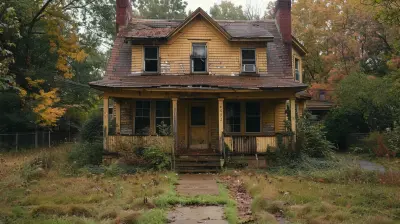How Staging Negotiations Can Influence the Perceived Value of a Home
15 June 2025
When it comes to selling a home, most people focus on pricing strategies, curb appeal, and marketing techniques. But one underrated factor that can significantly impact a home's perceived value? Staging negotiations.
Yes, you read that right. The discussions and agreements around how a home is presented can shape a buyer’s perception, which ultimately affects how much they're willing to pay. Staging is more than just arranging furniture—it's about crafting a vision that appeals to buyers on an emotional level. And negotiating the right staging elements can either make or break that vision.
In this article, we’ll dive deep into how staging negotiations influence a home’s perceived value and why sellers must take this seriously. If you're planning to sell your home (or just curious about the process), stick around—this might be the insider tip you never knew you needed! 
Understanding the Power of Staging in Real Estate
Staging is not just about making a house look nice; it's about helping buyers picture themselves living there. Buying a home is an emotional decision as much as a financial one. A well-staged home makes potential buyers feel a connection, which makes them more likely to place a competitive offer.The Psychology Behind Staging
There’s a reason why model homes are carefully styled. Buyers instinctively perceive a well-staged home to be:- More valuable – A home that looks high-end gives buyers the impression that it’s worth more.
- Move-in ready – Buyers don’t want to imagine work ahead; they want a seamless transition.
- Bigger & brighter – Proper staging can make a space feel more spacious and inviting.
Once you understand the psychology behind staging, it’s easier to see why negotiations around it can impact the final sale price. 
Staging Negotiations: Why They Matter
Many sellers assume that staging is a straightforward process—declutter, add accent pillows, maybe throw in a scented candle or two. But real estate professionals know there’s more to it than meets the eye.Sellers, buyers, and agents often negotiate staging elements. These negotiations can impact:
- The home’s perceived condition
- The emotional pull on the buyer
- The final sale price
Let’s break down the key ways in which staging negotiations can influence a home’s value. 
1. The Inclusion of Furnishings and Décor
Buyers sometimes fall in love with the way a home is staged. Those perfect furniture arrangements, accent pieces, and even artwork create an aspirational lifestyle. If a buyer expresses interest in specific staging pieces, sellers have room to negotiate.How does this affect perceived value?
- Including high-end furnishings in the sale can justify a higher price.
- A home staged with luxurious décor appears more elegant and valuable.
- Removing key staging pieces before showings can make a space feel empty or less appealing.
Pro tip: If selling a vacant home, consider investing in virtual staging—it’s cost-effective but still creates that desirable aesthetic. 
2. Negotiating Repairs vs. Cosmetic Staging
Sometimes, sellers face a choice: should they spend money on actual repairs, or can cosmetic staging do the trick? While necessary repairs shouldn't be ignored, staging can often minimize flaws and redefine how a home is perceived.For example:
- Instead of replacing outdated kitchen cabinets, painting them a stylish neutral shade and adding modern hardware can make them feel brand new.
- A fresh coat of paint and strategically placed mirrors can make a small room seem twice as large.
- Proper lighting can mask imperfections and create a bright, airy feel.
Negotiating staging strategies to enhance, rather than completely renovate, certain aspects of the home helps sellers save money while still increasing the home’s appeal.
3. The Emotional Factor in Pricing
Buyers don’t just purchase square footage and amenities—they buy the feeling a home gives them. That’s why professionally staged homes tend to sell for more than empty or poorly presented properties.If sellers and agents negotiate on staging elements that evoke emotion—such as a cozy reading nook, a beautifully set dining table, or a spa-like primary suite—buyers are more likely to submit higher offers.
Think about it: Would you pay more for a house that feels like a dream home, or one that feels like a blank slate?
Emotional connection leads to greater perceived value, and staging negotiations play a huge role in shaping that connection.
4. Virtual vs. Physical Staging: Cost vs. Impact
Sellers often negotiate whether to opt for physical or virtual staging.- Physical staging allows buyers to experience the space in person, building a stronger emotional attachment. However, it’s more expensive.
- Virtual staging is cheaper but only works for online listings. If buyers visit an empty home after seeing staged photos, they may feel disappointed.
Negotiating the right staging approach ensures that the home looks its best both online and in person. A home that makes a great first impression online (through virtual staging) and still wows buyers in person (through minimal physical staging) creates the best outcome.
5. The Role of Light and Space
Negotiating staging strategies for lighting and spatial perception can significantly impact how a home feels.- Natural light – Removing heavy drapes and strategically placing mirrors can brighten a room.
- Furniture arrangement – Buyers perceive a cluttered space as smaller. Proper furniture placement can make a room appear larger and more functional.
By carefully planning how light interacts with the space, a home can feel more open and instantly more valuable.
Final Thoughts: Maximize Value Through Smart Staging Negotiations
Staging negotiations are more than just an afterthought—they are a strategic tool for maximizing a home’s perceived value. Whether deciding on furniture placement, repairs, lighting, or emotional staging elements, sellers who leverage these aspects effectively can boost appeal and drive up offers.So, if you're gearing up to sell your home (or advising someone who is), don’t underestimate the power of thoughtful staging discussions. The right negotiations can mean the difference between an average offer and a top-dollar sale.
all images in this post were generated using AI tools
Category:
Real Estate NegotiationAuthor:

Travis Lozano
Discussion
rate this article
3 comments
Kairo McCartney
Staging effectively boosts a home's appeal, making negotiations smoother and potentially increasing sale price.
June 19, 2025 at 1:04 PM

Travis Lozano
Absolutely! Staging enhances a home's visual appeal, which not only attracts buyers but can also lead to higher offers and smoother negotiations.
Lanae Acevedo
Staging negotiations play a crucial role in shaping potential buyers' perceptions of a home's value. By highlighting a property's strengths and addressing its weaknesses through strategic presentation, sellers can create a compelling narrative that justifies a higher asking price, ultimately enhancing sale prospects.
June 16, 2025 at 3:51 AM

Travis Lozano
Absolutely! Staging negotiations are essential for influencing buyer perceptions and maximizing a home's value. By effectively showcasing a property's strengths and mitigating its weaknesses, sellers can create a compelling narrative that supports a higher asking price.
Zephyros McWilliams
Staging truly enhances a home's appeal and perceived value—great insights!
June 15, 2025 at 11:56 AM

Travis Lozano
Thank you! I'm glad you found the insights valuable. Staging really does make a significant difference!



